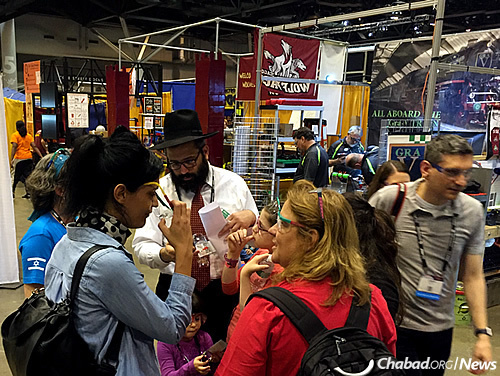When participants from 11 Israeli high school robotics teams discovered that they would be competing in St. Louis smack dab in the middle of Passover, they had a feeling that Chabad would be able to help. It didn’t take long for Rabbi Hershey Novack, director of the Chabad House at Washington University, to organize a holiday celebration and meal for more than 350 participants at the America’s Center Convention Complex downtown.
“This year is Hakhel, a year of gathering and Jewish unity,” said Novack. “This gave us an added impetus to work to bring people together to celebrate Jewish ritual and community, so it was very fitting to host this event as part of the robotics conference. The Israelis truly felt at home, even though they were halfway around the world.”
About 29,000 students and 800 robots participated in the FIRST Robotics Competition, the FIRST Tech Challenge and the FIRST LEGO League.
FIRST, which stands for “For Inspiration and Recognition of Science and Technology,” brought together students from 40 countries and 50 states to participate in sports-like matches in which robots—built at the students’ respective schools and then shipped to St. Louis—competed in various tasks. “Coopertition” is a core tenet of the FIRST philosophy, which helps create a sense of camaraderie at the matches, even between opposing teams.

Novack brought four yeshivah students to help staff the event, which included the participation of Israeli Arabs and Bedouins. A group from the Milken Community High School in Los Angeles also joined in. American inventor Dean Kamen, who founded FIRST in 1989, was there to welcome the group, sharing his value for Jewish traditions and recalling the seders of his youth. He also expressed his pride in all of the Israeli teams, casting them as a “model of cooperation” for the rest of the world.
“The students were very inspired and felt as one community,” said Yaarit Levy, CEO of FIRST in Israel. “The timing of the event, together with the fact that Dean Kamen and Megan Smith—the U.S. Chief Technology Officer in the Office of Science and Technology Policy—joined us, turned this event to something unique and empowering. It helped our students and teams to feel and be part of a larger community.”
After the holiday dinner had concluded, Novack and the yeshivah students walked back seven miles to the Chabad House in order to celebrate the remainder of the holiday with the campus community.
The Chabad House at Washington University remained open during the event, hosting 100-plus university students for holiday services, followed by a meal.









Start a Discussion